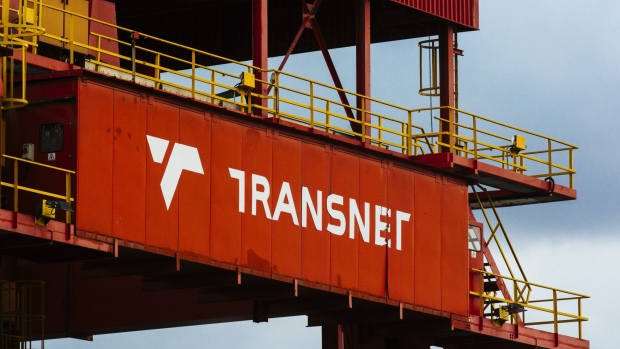Oct 7, 2022
Transnet Declares Force Majeure for Third Time in 15 Months
, Bloomberg News

(Bloomberg) -- South Africa’s port and freight-rail operator declared force majeure across all of the nation’s harbors after its employees began a strike over wages. Mining stocks dropped.
Transnet SOC Ltd. invoked the clause in anticipation of some of its operations being “scaled down,” the state-owned company said in a notice to its customers. “To the extent possible, we will attend to invoke contingency plans and source external stand-in/temporary resources to ensure that the operations continue across the various terminals.”
The strike by two labor unions at Transnet threatens to curb trade in materials including coal, iron ore, chrome and manganese because the company’s rail and ports network is key to South African exports of bulk commodities. Shares in Thungela Resources Ltd., the nation’s biggest shipper of thermal coal, and Exxaro Resources Ltd., the biggest miner of the fuel, fell in Johannesburg.
The South African ports are also crucial for shippers from other African nations including the Democratic Republic of Congo, the world’s biggest source of cobalt, landlocked Zambia, which ranks alongside Congo as one of Africa’s largest copper producers, and Zimbabwe, an exporter of gold, chrome and platinum.
It’s the fifth time in the past two years that Transnet has declared force majeure for events including riots in the KwaZulu-Natal province in July 2021, a cyber attack that incapacitated its container terminal, and a fire that disrupted bulk shipments.
Existing logistics constraints at Transnet are expected to cost South Africa’s mining industry 50 billion rand ($2.8 billion) in lost opportunities this year, Minerals Council South Africa Chief Executive Officer Roger Baxter said Oct. 5. The poor performance of Transnet rail lines and other infrastructure are as bad for the industry as the regular power outages the state electricity provider is implementing, he said.
Read: How Record Power Outages Are Hobbling Services in South Africa
Transnet links South African mines by rail to the nation’s ports. That includes an 861-kilometer (535-mile) iron-ore line that connects deposits in the Northern Cape to Saldanha Bay, and another corridor for coal and other minerals from Mpumalanga to Richards Bay.
“Thungela continues to engage with Transnet to understand further developments and in particular the impact of the declared force majeure on our business,” the company said in an emailed response to questions. Operations can continue without rail for a further seven days without Thungela experiencing “a significant impact on production,” though a prolonged strike of two weeks would curtail as much as 300,000 tons of export production, it said Thursday in a statement.
Coal prices surged earlier this year after Russia’s invasion of Ukraine. When Transnet sent coal miners notices in April that rail bottlenecks were beyond its control, Exxaro challenged its use of the legal condition.
“An extended event would be expensive,” Liberum analysts said in a note to clients. “With government support, we expect the strike event to end soon.”
The South African Transport and Allied Workers Union and the United National Transport Union declared a strike after months of wage talks deadlocked. Transnet on Wednesday doubled its offer to 3% in a bid to head off the work stoppage. The proposed pay increase is well below annual inflation of 7.6%.
The strike by the so-called UNTU labor union began on Thursday, while Satawu workers are scheduled to begin theirs on Oct. 10.
The remuneration of South African state employees accounts for almost a third of total government spending and keeping it in check is key to the National Treasury’s plans to rein in its budget deficit and bring runaway state debt under control. Eskom Holdings SOC Ltd., the state power utility, in July signed a pay deal with labor unions for a 7% increase to end an impasse that triggered a week of illegal protests and deepened electricity outages.
©2022 Bloomberg L.P.






